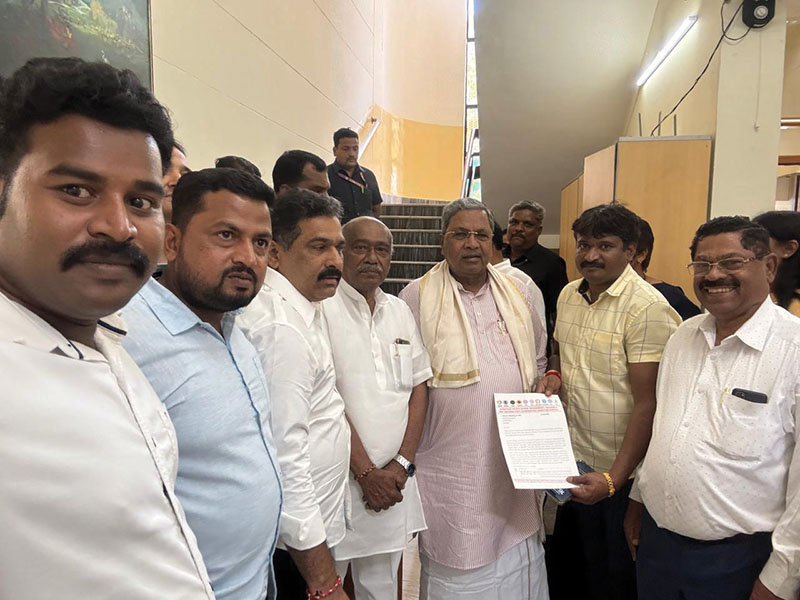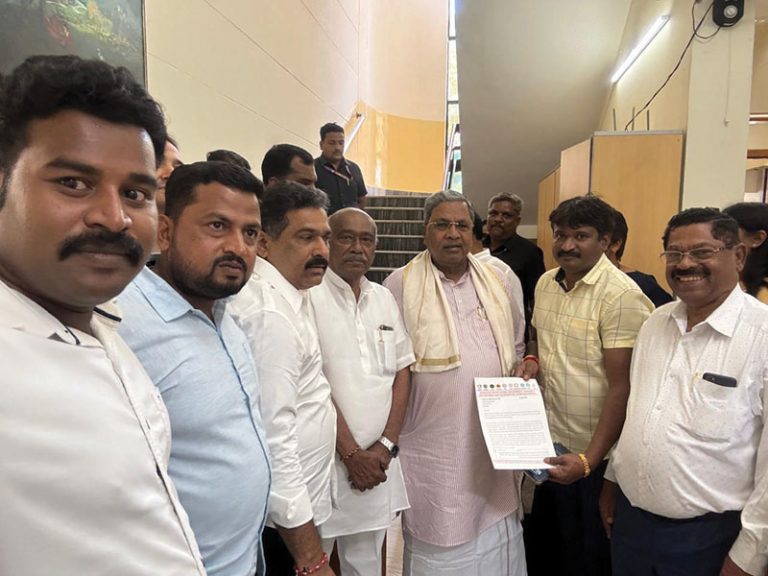Karnataka: Chaos & confusion
Reshma Ravishanker (Bengaluru)

KAMS’ Shashi Kumar (centre right) with CM Siddaramaiah
By several metrics, the southern state of Karnataka (pop.70 million) is India’s most educationally advanced. Bengaluru, the state’s admin capital, is widely regarded as the Silicon Valley of India for hosting a large number of new genre ICT (information communication technology) companies and huge back offices of IT multinationals including Google, Microsoft, Intel and Accenture.
The garden city also hosts several top-ranked science and technology higher ed institutions including the Indian Institute of Science, National Institute of Advanced Studies, IIM-Bangalore, National Law School of India University with Karnataka hosting 290 engineering colleges. Unsurprisingly, the state contributes 20 percent of India’s annual exports of ICT services valued at $58 billion.
However, the quality of school-leavers entering the state’s vaunted higher education institutions (HEIs) is set to diminish because of continuous chaos and confusion in public K-12 education. In particular, under supervision of the one-year-old Congress government and education minister Madhu Bangarappa, K-12 education in the state is experiencing unprecedented chaos and confusion.
In March, the Karnataka high court issued an order barring the state government from conducting ‘board exams’ for class V, VIII and IX students of 56,157 government and private schools affiliated with the Karnataka School Examination and Assessment Board (KSEAB). Subsequently on appeal, a two-judge bench of the high court directed KSEAB to conduct the exams without delay “in the interest of students”.
On April 8, the Supreme Court restrained the state government from publishing results of the board exams on the ground that conduct of exams for children in elementary classes (I-VIII) violates the landmark Right of Children to Free & Compulsory Education (RTE) Act, 2009, which prohibits formal exams for primary/elementary school children.
Simultaneously, another row erupted over conduct of the Karnataka Common Entrance Test (KCET) 2024, which determines undergrad admissions into 290 engineering colleges statewide. The KCET test papers, written by 3.34 lakh class XII students on April 18-19, included 50 questions which were beyond the syllabus prescribed for state board pre-university college (PUC) students. Following strident protests from faculty, students and parents’ associations, the state government issued a statement (April 28) saying that the Karnataka Examination Authority (KEA) has been directed not to evaluate students’ answers to the 50 out-of-syllabus questions.
Even as the dust was settling down on this mess, on May 8, the Congress government issued a notification scrapping implementation of the National Education Policy (NEP) 2020 formulated by the Dr. K. Kasturirangan Committee after a hiatus of 34 years, and proposed formulation of its own State Education Policy under the chairmanship of Prof. Sukhadeo Thorat, former chairman of the University Grants Commission (UGC). As a result, all undergrad colleges statewide which had introduced the four-year bachelor’s degree mandated by NEP 2020, reverted to the previous three-year degree programme.
The outcome of swirling confusion in the state’s education sector manifested in the state’s class X SSLC (Secondary School Leaving Certificate) exam. Of the 8.59 lakh students who wrote the exam, a mere 54 percent (cf. 84 percent in 2023) passed. Expecting a huge public outcry, the education ministry awarded all students who wrote the exams “grace marks” and pushed the pass percentage to 73.4. “The pass percentage declined by 30 percentage points over last year. Hence, the government has decided to enhance normalisation in the interest of students. Grace marks have been increased from 10 percent to 20 percent in all subjects as a one-time measure. After normalisation, the pass percentage rose to 73.40 percent,” Manjushree N, KSEAB chairperson, told media on May 9, attributing the low pass percentage this year to stringent invigilation including use of CCTVs to curb malpractice in exam halls.
All this confusion in the state’s education sector has generated great resentment in Karnataka, a state which prides itself for its education heritage. And increasingly, public ire is being directed at Madhu Bangarappa, minister for school education and literacy. During all these controversies, the minister did not call a press conference or publicly meet aggrieved students, parents and/or schools. According to Congress party sources, Bangarappa is one of the party’s star campaigners for General Election 2024 and was “busy campaigning across the state”.
On May 13, representatives of the Associated Managements of Private Schools in Karnataka (KAMS) and Karnataka Private School Managements, Teaching & Non-Teaching Staff Co-ordination Committee (KPMTCC) met with chief minister Siddaramaiah and urged him to pull up education ministry officials, including Bangarappa. “We had met the education minister five months ago when he gave us a patient hearing. After that, he has been incommunicado. We wonder if his private secretary has taken charge as he responds on his behalf on all issues,” says D. Shashikumar, general secretary, KAMS.
According to Shashikumar, the education ministry is overrun with touts and agents even as ministry officials are demanding bribes by threatening to shut down 17,000 ‘unauthorised’ private schools. “The state’s education system is crumbling. As the pathetic pass percentage in SSLC exams indicates, students’ learning outcomes are declining and need urgent attention including training of teachers to provide remedial education. But neither ministry officials nor the minister are interested in mending the system. Their priority is to harass private schools on petty technical grounds,” laments Kumar.
However according to Congress party insiders, the government is unlikely to reprimand, let alone sack Bangarappa, because the youthful minister, distinguished by shoulder-length hair, has established his credentials as a star elections campaigner of the Congress party.
Also read: Karnataka: Private schools ask CM to crack the whip against edu department and minister

















Add comment